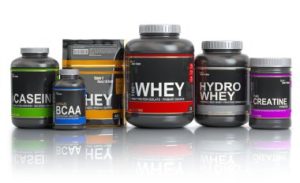
Can You Take Protein Supplement Without Exercise (6 Important Facts)
Can you take protein supplements without exercise? While protein supplements are commonly associated with fitness and muscle-building routines, they can also be beneficial for individuals looking to meet their daily protein requirements or those with specific dietary needs. In a world pulsating with health trends and fitness fads, the question arises: can one sip from the protein fountain without breaking a sweat in the gym?
Picture this: the allure of sculpted muscles and toned physiques, all achieved with the mere twist of a protein shaker cap, sans the grueling hours on the treadmill. It’s a tantalizing notion that beckons both the fitness novices and the seasoned gym buffs alike. But amidst the clamor of conflicting advice and the cacophony of fitness culture, emerges the enigma: Can you take protein supplements without exercise? Let’s embark on a journey beyond the weights and into the realm of nutritional science, where the answer unveils itself amidst the haze of misconceptions and the gleam of possibility.

Can You Take Protein Supplement Without Exercise
Yes, you can take protein supplements without exercise, but it’s essential to understand their purpose and potential effects. While protein is crucial for muscle repair and growth, consuming supplements without physical activity might not yield the desired results.
Understanding Protein Supplements and Exercise
Protein supplements are widely used to support muscle recovery, enhance athletic performance, and aid in weight management. However, their effectiveness largely depends on factors such as diet, lifestyle, and individual goals.
Taking Protein Supplements Without Exercise
While it’s possible to consume protein supplements without exercise, their benefits may be limited. Without physical activity to stimulate muscle growth and repair, excess protein intake could potentially be stored as fat or excreted by the body.
Considerations for Non-Exercisers
For individuals not engaging in regular exercise, it’s essential to moderate protein intake to avoid excessive consumption. Consulting with a healthcare professional or nutritionist can provide personalized guidance on protein supplementation and overall dietary needs.
Understanding Protein Supplements
Types of protein supplements
Whey Protein
Whey protein is one of the most popular types of protein supplements available on the market today. Derived from milk during the cheese-making process, whey protein is rich in essential amino acids, making it a complete protein source. It is quickly absorbed by the body, making it an ideal choice for post-workout recovery or as a convenient way to increase daily protein intake.
Whey protein comes in various forms, including concentrate, isolate, and hydrolysate, each offering different levels of protein purity and digestibility. Additionally, flavored whey protein powders provide a tasty option for those looking to add variety to their shakes or smoothies. Whey protein supplements are widely favored by athletes, fitness enthusiasts, and individuals seeking to support muscle growth, repair, and overall health and wellness.
Casein Protein
Casein protein is one of the primary types of protein supplements available to fitness enthusiasts and athletes. Derived from milk, casein is a slow-digesting protein that provides a sustained release of amino acids into the bloodstream, making it an ideal choice for consumption before bedtime or during prolonged periods without food.
This slow digestion rate helps in promoting muscle protein synthesis and preventing muscle breakdown, particularly during periods of fasting such as overnight. Additionally, casein is rich in essential amino acids, including branched-chain amino acids (BCAAs), which are crucial for muscle repair and growth. Due to its unique properties, casein protein is often favored by individuals aiming to support muscle recovery, promote muscle growth, and maintain overall muscle health.
Soy Protein
Soy protein is a widely recognized and utilized form of protein supplement, particularly favored among vegetarians and vegans due to its plant-based origin. Derived from soybeans, it provides a complete source of protein, containing all essential amino acids necessary for muscle repair and growth. Often available in various forms such as protein powders, bars, and shakes, soy protein offers versatility in consumption. Additionally, it is renowned for its potential health benefits, including cholesterol reduction and cardiovascular support. With its high protein content and numerous health advantages, soy protein stands as a prominent option for individuals seeking to supplement their dietary protein intake.
Pea Protein
Pea protein is a plant-based protein supplement derived from yellow peas. It has gained popularity among vegetarians, vegans, and individuals with dairy or soy allergies due to its high protein content and complete amino acid profile. Pea protein is easily digestible and rich in branched-chain amino acids (BCAAs), which are crucial for muscle recovery and growth.
Additionally, it is naturally free of common allergens and is lactose-free, making it suitable for those with dietary restrictions. Pea protein supplements come in various forms such as powders, bars, and shakes, providing versatility in consumption. Whether blended into smoothies or incorporated into baked goods, pea protein offers a convenient and nutritious way to meet daily protein needs for individuals following diverse dietary preferences and lifestyles.

Forms of protein supplements
Protein supplements come in various forms, catering to different preferences and dietary needs. One common form is protein powder, which is typically derived from sources like whey, casein, soy, pea, or hemp. These powders can be mixed with water, milk, or blended into smoothies, offering a convenient way to increase protein intake.
Another popular form is protein bars, which provide a portable and tasty option for on-the-go consumption. Liquid protein supplements, such as ready-to-drink shakes, offer quick and convenient protein replenishment. For those seeking alternatives to animal-derived proteins, plant-based protein supplements, including powders, bars, and shakes, are widely available. Additionally, protein supplements can also be found in the form of protein-enriched snacks like cookies or crisps, providing versatility in meeting individual nutritional goals and preferences.
Nutritional content and benefits
Protein Content per Serving
Protein content per serving is a vital nutritional aspect that plays a crucial role in maintaining overall health and supporting various bodily functions. Proteins are the building blocks of life, essential for repairing tissues, building muscle mass, and regulating metabolism. The protein content per serving of a food or supplement provides valuable information regarding its potential to fulfill dietary requirements and contribute to achieving fitness goals.
Whether it’s from animal or plant-based sources, the protein content per serving informs individuals about the adequacy of their intake for promoting muscle recovery, sustaining energy levels, and supporting overall well-being. Monitoring protein intake per serving is particularly important for athletes, fitness enthusiasts, and individuals seeking to optimize their nutritional intake for improved performance and health outcomes.
Amino Acid Profile
An amino acid profile is a comprehensive representation of the types and quantities of amino acids present in a biological sample, typically referring to proteins. Amino acids are the building blocks of proteins, essential for various physiological functions in organisms. There are twenty standard amino acids, each with unique chemical structures and properties. The composition of amino acids within a protein can greatly influence its structure, stability, and function.
Analyzing the amino acid profile of a protein can provide valuable insights into its nutritional quality, biological activity, and potential health benefits. Additionally, variations in amino acid profiles can be indicative of differences in protein sources, processing methods, or genetic mutations, making it a crucial aspect of protein characterization in fields ranging from nutrition and biochemistry to pharmaceuticals and biotechnology.
Role in Muscle Repair and Growth
Protein supplements play a pivotal role in muscle repair and growth, serving as a cornerstone in the fitness and athletic community. These supplements provide essential amino acids, the building blocks of protein, which are crucial for repairing muscle tissue damaged during intense physical activity. By delivering a concentrated dose of amino acids, protein supplements expedite the recovery process, allowing muscles to rebuild and grow stronger.
Moreover, protein supplements facilitate muscle protein synthesis, the process through which new muscle tissue is formed, promoting hypertrophy and overall muscle development. Whether consumed post-workout to jumpstart recovery or as part of a balanced diet, protein supplements serve as a reliable means to support muscle repair and growth, enabling individuals to achieve their fitness goals more effectively.
Protein’s Role in the Body
Protein’s function in the body
Building blocks of tissues
Proteins are indispensable molecules in the human body, serving a multitude of vital functions. One of their primary roles lies in being the fundamental building blocks of tissues, including muscles, organs, skin, hair, and nails. Structurally, they provide the framework for cellular and tissue integrity, ensuring strength, flexibility, and cohesion.
Beyond mere structural support, proteins partake in numerous physiological processes, acting as enzymes, hormones, antibodies, and transporters. Enzymes, for instance, catalyze biochemical reactions, facilitating metabolism and ensuring cellular functions proceed efficiently. Hormonal proteins regulate various bodily processes, orchestrating growth, development, and reproduction.
Moreover, antibodies play a crucial role in the immune system, defending against pathogens and maintaining health. Overall, proteins are indispensable for the body’s structure, function, and overall well-being, embodying the essence of life itself.
Enzymes and hormones
Proteins serve crucial functions in the body, playing pivotal roles as enzymes and hormones. Enzymes, often referred to as the body’s molecular catalysts, facilitate biochemical reactions essential for metabolism, digestion, and cellular processes. These proteins accelerate chemical reactions by lowering the activation energy required for the reaction to occur, thereby increasing the speed at which biological processes take place.
Additionally, hormones, another class of proteins, act as signaling molecules that regulate various physiological functions such as growth, development, and metabolism. Hormones are secreted by endocrine glands into the bloodstream, where they travel to target tissues to elicit specific responses. Whether catalyzing reactions or regulating bodily functions, proteins, in their enzymatic and hormonal roles, are indispensable for maintaining the intricate balance and functionality of the human body.
Immune function
Proteins play a vital role in supporting immune function within the body. They serve as building blocks for antibodies, which are crucial components of the immune system responsible for identifying and neutralizing harmful pathogens such as bacteria, viruses, and other invaders. Additionally, certain proteins, known as cytokines, act as signaling molecules that regulate immune responses, coordinating the body’s defense mechanisms against infections and diseases.
Moreover, proteins contribute to the production and maintenance of white blood cells, including T cells and B cells, which are integral to adaptive immunity. Thus, a balanced intake of proteins is essential for maintaining a robust immune system and protecting the body from various illnesses and infections.
Protein metabolism
Digestion and absorption
Protein metabolism encompasses the intricate processes through which proteins are broken down, synthesized, and utilized within the body. Digestion marks the initial phase, commencing in the stomach where gastric juices, primarily hydrochloric acid and pepsin, begin the breakdown of dietary proteins into smaller polypeptides. Further enzymatic action occurs in the small intestine facilitated by proteases from the pancreas and brush border enzymes, resulting in the breakdown of polypeptides into amino acids, dipeptides, and tripeptides.
These smaller molecules are then absorbed across the intestinal epithelium into the bloodstream via specific transporters. Once absorbed, amino acids are transported to various tissues where they partake in protein synthesis for tissue repair, growth, and maintenance. Excess amino acids can be converted into energy through pathways like gluconeogenesis or undergo deamination to be used for energy or converted to fat. Ultimately, protein metabolism intricately regulates bodily functions, ensuring the proper functioning and repair of tissues while providing energy when needed.
Protein synthesis and breakdown
Protein metabolism encompasses the dynamic processes of protein synthesis and breakdown within living organisms. Protein synthesis involves the assembly of amino acids into polypeptide chains according to genetic instructions encoded in DNA. This intricate process occurs in ribosomes, where messenger RNA (mRNA) serves as a template for the sequence of amino acids. Protein breakdown, on the other hand, involves the degradation of proteins into their constituent amino acids, which can then be recycled for new protein synthesis or used as energy sources.
Various factors, such as hormonal regulation, nutritional status, and cellular signaling pathways, influence the balance between protein synthesis and breakdown, ensuring the maintenance of cellular homeostasis and supporting vital functions throughout the body, including growth, repair, and immune response. Disruptions in protein metabolism can lead to a myriad of health issues, highlighting the significance of understanding and regulating these intricate biochemical processes.
Daily protein requirements
Recommended dietary allowance (RDA)
The Recommended Dietary Allowance (RDA) for protein represents the daily amount of this essential macronutrient that individuals should consume to maintain optimal health. The RDA for protein varies based on factors such as age, sex, weight, and activity level. Typically, adults require around 0.8 grams of protein per kilogram of body weight per day.
However, certain groups, such as athletes, pregnant or lactating women, and individuals recovering from illness or injury, may require higher amounts. Protein is crucial for various bodily functions, including muscle repair and growth, enzyme production, and immune system support. Meeting the RDA for protein ensures that individuals can maintain muscle mass, support overall health, and meet their body’s daily needs for growth and repair.
Factors influencing protein needs
Protein needs are influenced by various factors that encompass an individual’s physiological, lifestyle, and health-related aspects. Firstly, one’s age plays a significant role; children and adolescents require more protein for growth and development, while older adults may need increased protein to offset muscle loss and maintain overall health.
Secondly, activity level and exercise intensity contribute significantly; athletes and those engaged in rigorous physical activity often require higher protein intake to support muscle repair and recovery. Additionally, body composition and weight goals are crucial factors; individuals aiming for muscle gain or weight loss may adjust their protein intake accordingly.
Moreover, health status, such as pregnancy or illness, can influence protein requirements, with pregnant women needing extra protein for fetal development and individuals recovering from illness or injury requiring increased intake for tissue repair. Lastly, dietary factors like protein quality and source also impact requirements, with complete proteins containing all essential amino acids being particularly important for meeting protein needs efficiently.
Exercise and Protein Utilization
Exercise-induced muscle damage
Exercise-induced muscle damage refers to the microtrauma that occurs within muscle fibers during physical activity, particularly intense or unfamiliar exercises. This damage prompts the body to repair and rebuild muscle tissue, contributing to strength and growth over time.
Protein turnover during exercise
Protein turnover during exercise refers to the dynamic process of protein synthesis (building new proteins) and breakdown (degradation of existing proteins) within the body’s muscles. This process is influenced by factors such as exercise intensity, duration, and individual training status.
Role of protein in muscle repair and growth
Protein plays a crucial role in muscle repair and growth by providing the necessary building blocks (amino acids) for muscle tissue synthesis. Adequate protein intake supports the repair of exercise-induced muscle damage and facilitates muscle hypertrophy (growth).
Timing of protein consumption around exercise
Pre-workout protein intake
Consuming protein before exercise can help prime the body for muscle repair and growth by providing amino acids to support protein synthesis during and after the workout. It may also help prevent muscle protein breakdown during exercise.
Post-workout protein intake
Post-workout protein intake is crucial for maximizing muscle repair and growth, as the body is primed to utilize amino acids for muscle tissue synthesis during the recovery period following exercise.
Effect of exercise type on protein requirements
Resistance training
Resistance training, such as weightlifting, places significant stress on muscles, leading to increased protein requirements for muscle repair and growth. Adequate protein intake is essential to support recovery and adaptation to resistance exercise.
Endurance training
Endurance training, such as long-distance running or cycling, also increases protein requirements, albeit to a lesser extent compared to resistance training. Protein plays a role in supporting muscle repair and adaptation to the repetitive stress of endurance exercise.

Can You Take Protein Supplements Without Exercise
Protein Supplements for Sedentary Individuals
Protein Needs for Inactive Individuals
Protein supplements can play a vital role in meeting the dietary needs of sedentary individuals. While the protein requirements for those leading a largely inactive lifestyle may not be as high as those engaged in intense physical activity, it remains essential for maintaining overall health. Sedentary individuals often overlook their protein intake, which can lead to muscle loss and a compromised immune system over time.
Incorporating protein supplements into their diet can help bridge this nutritional gap, supporting muscle maintenance and repair. Additionally, protein supplements can aid in weight management by promoting satiety, which may be particularly beneficial for sedentary individuals prone to overeating. However, it’s crucial for sedentary individuals to choose high-quality protein sources and consult with a healthcare professional to determine their specific nutritional needs.
Dietary Sources vs. Supplements
For sedentary individuals, protein supplements can be a contentious topic when compared to obtaining protein from dietary sources alone. While protein is crucial for overall health, particularly for muscle repair and maintenance, sedentary lifestyles may not require as much protein intake as those engaged in regular physical activity.
For such individuals, getting protein from whole food sources like lean meats, fish, eggs, dairy, legumes, and nuts can often suffice, providing additional nutrients and fiber that supplements lack. However, protein supplements can offer convenience and a quick protein boost, especially for those who struggle to meet their protein needs through food alone or have specific dietary restrictions. Nonetheless, it’s essential for sedentary individuals to balance their protein intake with their overall caloric needs and to prioritize whole foods whenever possible to ensure a well-rounded and nutritious diet.

Potential Benefits of Protein Supplementation Without Exercise
Muscle Preservation During Aging
Protein supplementation, even without exercise, holds significant promise in aiding muscle preservation during the aging process. As individuals grow older, maintaining muscle mass becomes increasingly challenging due to physiological changes such as decreased protein synthesis and heightened muscle breakdown. However, protein supplementation offers a viable solution by providing essential amino acids necessary for muscle repair and regeneration.
By fortifying the diet with supplemental protein, particularly rich in leucine—a key amino acid involved in muscle protein synthesis—older adults can potentially offset muscle loss, thereby preserving strength and functionality. Additionally, adequate protein intake can support other vital physiological processes beyond muscle maintenance, such as immune function and wound healing, contributing to overall health and well-being in aging populations. Thus, protein supplementation emerges as a valuable tool in promoting healthy aging and mitigating the adverse effects of muscle decline, offering a pathway to enhanced vitality and independence in later stages of life.
Appetite Regulation and Weight Management
Protein supplementation, even without accompanying exercise, can yield several potential benefits, notably in appetite regulation and weight management. High-protein diets have been linked to increased feelings of fullness and satiety, which can aid in controlling calorie intake and reducing overall food consumption. Additionally, protein-rich foods require more energy for digestion, leading to a higher thermic effect compared to carbohydrates or fats, potentially aiding in weight loss efforts.
By promoting satiety and enhancing metabolic processes, protein supplementation alone may contribute to more effective weight management strategies, offering individuals a valuable tool in their pursuit of healthier lifestyles. However, it’s essential to note that individual responses to protein intake may vary, and consulting with a healthcare professional or registered dietitian is advisable to ensure proper dietary balance and personalized recommendations.
Nutritional Convenience
Potential benefits of protein supplementation without exercise extend beyond muscle growth and repair. One notable advantage lies in its nutritional convenience. Protein supplements offer a quick and efficient way to increase protein intake, especially for individuals with busy lifestyles or those struggling to meet their daily protein requirements through whole foods alone.
Whether in the form of shakes, bars, or powders, these supplements provide a concentrated source of high-quality protein, aiding in satiety and supporting various bodily functions beyond just muscle maintenance. Moreover, for individuals with specific dietary restrictions or preferences, such as vegetarians or vegans, protein supplements offer a convenient means to ensure adequate protein intake without having to meticulously plan meals or constantly track macronutrient consumption. Thus, protein supplementation can serve as a convenient and practical solution to support overall health and wellness, even in the absence of regular exercise.
Potential Risks or Considerations
Excess Calorie Intake
Excess calorie intake poses a significant risk to overall health and well-being, potentially leading to a myriad of health complications. Consuming more calories than the body requires can contribute to weight gain and obesity, which are associated with numerous health issues such as diabetes, cardiovascular diseases, and certain cancers.
Moreover, excessive calorie intake often means consuming nutrient-poor, processed foods high in sugars, unhealthy fats, and additives, which can further exacerbate health problems. Additionally, overconsumption of calories can strain the body’s organs and metabolic processes, leading to fatigue, reduced energy levels, and decreased quality of life. Therefore, it’s crucial to be mindful of calorie intake and strive for a balanced diet to mitigate these risks and maintain optimal health.
Digestive Issues
Potential risks or considerations associated with digestive issues encompass a spectrum of concerns ranging from mild discomfort to severe health complications. Digestive problems can disrupt daily life, causing discomfort, bloating, diarrhea, or constipation. Chronic conditions like irritable bowel syndrome (IBS), Crohn’s disease, or gastroesophageal reflux disease (GERD) pose long-term challenges and may require ongoing management.
Furthermore, untreated digestive issues can lead to nutritional deficiencies, dehydration, weight loss, and impaired quality of life. In severe cases, complications such as gastrointestinal bleeding, ulcers, or bowel obstructions can arise, necessitating immediate medical attention. Moreover, digestive disturbances can be indicative of underlying health issues, including food intolerances, infections, or even certain cancers, underscoring the importance of timely diagnosis and intervention. Thus, while often viewed as common inconveniences, digestive issues warrant careful attention and appropriate medical management to mitigate potential risks and ensure overall well-being.
Long-Term Effects on Kidney Function
Using protein supplements without engaging in exercise poses potential risks, particularly concerning long-term effects on kidney function. When protein intake surpasses the body’s needs, excess protein can strain the kidneys as they work to filter waste products. Without the counterbalance of exercise to utilize the additional protein effectively, this strain may exacerbate existing kidney conditions or contribute to the development of kidney problems over time. High protein intake without corresponding physical activity can also lead to dehydration, further stressing the kidneys. Therefore, it’s crucial to maintain a balanced approach, ensuring that protein supplementation is complemented by appropriate exercise to mitigate these potential risks and support overall kidney health.
Cost Considerations
Without regular exercise, the excess protein consumed through supplements may not be effectively utilized by the body and could instead be stored as fat, leading to weight gain. Moreover, relying solely on supplements without engaging in physical activity may not provide the full spectrum of nutrients and health benefits that come with a balanced diet and exercise routine.
From a financial standpoint, purchasing protein supplements without complementing them with exercise may not offer the best return on investment, as the benefits of supplementation are optimized when combined with a consistent workout regimen. Therefore, individuals considering protein supplements should weigh the cost against their commitment to regular exercise to ensure they are maximizing their health and financial resources effective
Individual Factors Influencing the Decision
Health Status
The state of one’s health, whether it be physical, mental, or emotional, profoundly impacts the choices individuals make regarding their lifestyles, habits, and priorities. Someone in optimal health may feel empowered to pursue ambitious goals, make long-term commitments, and engage in physically demanding activities.
Conversely, individuals grappling with health challenges might prioritize self-care, seek medical interventions, or adjust their aspirations to accommodate their limitations. Health status also influences decisions regarding diet, exercise, leisure activities, and medical treatment options. Ultimately, individual health status serves as a significant determinant in shaping the trajectory of one’s life choices and aspirations.
Dietary Habits
Individual factors influencing dietary habits can be multifaceted, encompassing personal preferences, cultural influences, socioeconomic status, and health considerations. Preferences for certain tastes, textures, and flavors play a significant role in shaping dietary choices, as individuals often gravitate towards foods that they find enjoyable or comforting.
Cultural background also heavily influences dietary habits, with traditions, rituals, and culinary practices dictating food choices within communities. Socioeconomic status can impact access to nutritious foods, with factors such as income level, education, and food availability shaping dietary patterns. Additionally, health considerations, including allergies, intolerances, and medical conditions, guide individuals towards specific dietary restrictions or preferences aimed at promoting well-being and managing health conditions. Overall, individual factors intertwine to create a unique dietary profile for each person, reflecting a complex interplay of personal, cultural and environmental influences.
Fitness Goals
Individual factors play a pivotal role in shaping decisions regarding fitness goals. Personal motivations, such as the desire for improved health, increased energy levels, or enhanced physical appearance, heavily influence these choices. Additionally, factors like age, current fitness level, lifestyle, and previous experiences with exercise can all impact the types of fitness goals individuals set for themselves.
For instance, someone in their twenties might prioritize building muscle mass, while a middle-aged individual may focus more on overall cardiovascular health. Moreover, personality traits such as determination, discipline, and self-efficacy can also sway decisions, as individuals with higher levels of these traits are more likely to commit to and achieve their fitness goals. Ultimately, the interplay of these individual factors creates a unique blueprint guiding each person’s fitness journey.
Frequently Asked Questions (FAQ) about Can You Take Protein Supplement Without Exercise
Q1. Can I take protein supplements without exercising?
A. Yes, you can take protein supplements without exercising. However, it’s important to understand your individual health and dietary needs to ensure you’re consuming them appropriately.
Q2. What are the benefits of taking protein supplements without exercise?
A. Protein supplements can still offer benefits such as supporting muscle repair and growth, aiding in weight management, and providing a convenient source of nutrients, even without exercise. However, the effectiveness may vary depending on individual factors.
Q3. Will taking protein supplements without exercise make me gain weight?
A. Not necessarily. Weight gain depends on various factors including total calorie intake, macronutrient composition of your diet, and overall lifestyle. Protein supplements alone won’t cause weight gain if consumed within your daily calorie needs.
Q4. Can I use protein supplements for meal replacement without exercising?
A. While protein supplements can be used as a meal replacement, it’s important to ensure you’re still getting essential nutrients from other food sources. Using them occasionally as a supplement to your diet can be fine, but they shouldn’t replace whole meals consistently.
Q5. Are there any potential risks of taking protein supplements without exercise?
A. Excessive protein intake without the corresponding energy expenditure from exercise can potentially strain your kidneys and liver over time. Additionally, if protein supplements contribute significantly to your calorie intake without sufficient physical activity, it may lead to weight gain.
Q6. How much protein should I consume if I’m not exercising regularly?
A. The recommended daily intake of protein varies based on factors such as age, gender, and overall health. Generally, aim for around 0.8 grams of protein per kilogram of body weight if you’re not exercising regularly. However, individual needs may vary.
Q7. Can taking protein supplements without exercise help with muscle recovery after injury or illness?
A. Yes, protein is essential for muscle repair and recovery, so consuming protein supplements can aid in recovery even if you’re not actively exercising. However, it’s important to follow your healthcare provider’s recommendations for proper recovery.
Q8. Will taking protein supplements without exercise make me bulky?
A. No, protein supplements alone won’t make you bulky. Building muscle mass typically requires consistent resistance training along with adequate protein intake. Without exercise, protein supplements are less likely to lead to significant muscle growth.
Q9. Can I take protein supplements to improve my hair, skin, and nails without exercising?
A. Protein is indeed essential for the health of hair, skin, and nails. While protein supplements may support overall nutrition, their direct impact on these aspects without exercise might be limited. A balanced diet with various nutrient sources is crucial for optimal skin, hair, and nail health.
Q10. Should I consult a healthcare professional before taking protein supplements without exercise?
A. It’s always a good idea to consult with a healthcare professional or a registered dietitian before starting any new supplement regimen, especially if you have underlying health conditions or concerns about your dietary needs. They can provide personalized recommendations based on your individual circumstances.
Conclusion
In conclusion, while it is technically possible to take protein supplements without engaging in regular exercise, their benefits are maximized when combined with a consistent workout regimen. Protein supplements can support muscle repair, growth, and overall health, particularly for individuals with higher protein requirements or those struggling to meet their dietary needs through whole foods alone. However, without exercise, the surplus protein may not be effectively utilized by the body and could potentially contribute to weight gain or other health issues. Therefore, for optimal results, protein supplements should complement a balanced diet and active lifestyle, ensuring that the body receives the necessary nutrients to thrive.